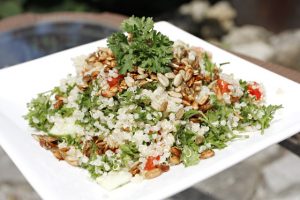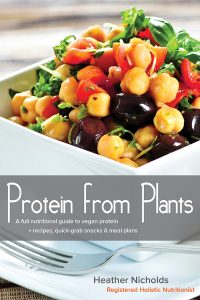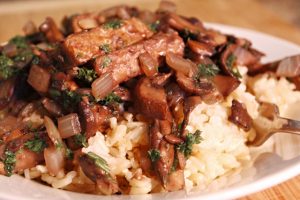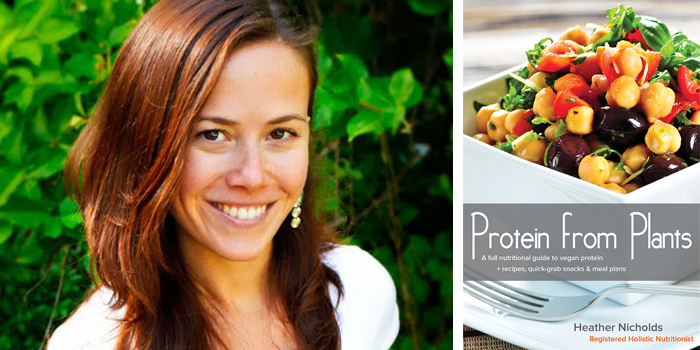 Heather Nicholds is a Registered Holistic Nutritionist who helps clients reconnect with food as a positive source of nourishment and energy. She’s known for the attention and care she puts into each and every meal plan, each and every class or workshop, each and every recipe. She makes the healthy part flow effortlessly for you, and the meals so crazy delicious that you’ll wind up making them over and over again. Heather’s new book Protein from Plants is available in a print version or for Kindle.
Heather Nicholds is a Registered Holistic Nutritionist who helps clients reconnect with food as a positive source of nourishment and energy. She’s known for the attention and care she puts into each and every meal plan, each and every class or workshop, each and every recipe. She makes the healthy part flow effortlessly for you, and the meals so crazy delicious that you’ll wind up making them over and over again. Heather’s new book Protein from Plants is available in a print version or for Kindle.
Chic Vegan: What motivated you to become vegan? Was it an overnight switch or more gradual shift?
Heather Nicholds: Initially, my motivation was learning about the environmental impact of animal agriculture. That was my tipping point. I realized I could do something to make a difference. Something that was entirely under my control. When you add in saving animals’ lives and hopefully boosting my chances of staying healthy into old age, it’s a no brainer. I went vegetarian overnight, and then a few months later I went vegan overnight, when I learned that all the same issues applied to dairy and egg production. I know that not everyone can make such a big change overnight, but I love change and challenges, and my motivation was so strong that it wasn’t really a choice – it was the only way I could go forward with the knowledge I had. Learning how to make healthy, balanced and delicious vegan meals every day, though – that was a very gradual process! There were definitely some disasters in the early days. That’s when having the trifecta of motivation really helps to perservere through the failures.
 CV: What changes did you notice in yourself after going vegan?
CV: What changes did you notice in yourself after going vegan?
HN: I began actually enjoying cooking. Up to that point, I struggled to figure out how to cook foods properly, I hated handling raw animal flesh, I worried about bacterial contamination, It was gross and frustrating trying to clean pots and pans. Going vegan ended all of that, and opened the door for me to learn about flavors, experiment with different ways of preparing foods, and discover new foods I’d never heard of before – like buckwheat.
From a health perspective, as I added more whole foods and fresh produce, I found that some really bad indigestion and gas cleared away, I had more energy and I got sick a lot less often.
 CV: Tell me a little bit about your new book Protein from Plants and what inspired you to write it.
CV: Tell me a little bit about your new book Protein from Plants and what inspired you to write it.
HN: Essentially the reason I wrote this book is: when people think about going vegan, they worry about protein. And if I can help explain why that’s nothing to worry about, and give the information that they need to be healthy, my hope is that more people will be willing to make the shift.
The book is part nutrition resource, part cookbook… my approach as a nutritionist is about making the science easily understandable, plus giving delicious recipes to make it actionable.
So the first half of the book is three sections that give a full understanding of protein, including how much you actually need and how you can more than enough from plant foods. The second half is full of high-protein vegan recipes, along with 7 days worth of balanced meal plans to show you exactly how to get all the protein you need from plants.
 CV: The number one question most vegans get asked is, “where do you get your protein?” Why do you think our culture is so obsessed with protein?
CV: The number one question most vegans get asked is, “where do you get your protein?” Why do you think our culture is so obsessed with protein?
HN: I honestly don’t know. Someone has done a really good marketing job promoting protein, and the idea that “protein foods” are the best. To think that a meal is healthy just because it’s high in protein is so strange to me. All the focus on protein pancakes doesn’t make for an overall healthy, balanced diet. There is such a thing as too much protein! Early signs are mild – things like being irritable, having brain fog, feeling thirsty, being constipated, having bad breath. It could progress though, and put a serious toll on your kidneys from having to break down and filter the protein.
From the perspective of non-vegans, I think the obsession comes from being taught to balance our plates with portions of protein foods, starch foods, and vegetables. The trouble is, in the plant kingdom, most foods have protein, starch, and vitamins and minerals – along with fiber, water, antioxidants and more. So we don’t have a direct swap for “protein foods” and we have to rebalance our plates a little bit. We can’t point to our plates and say “that’s my protein quadrant.” There’s protein in everything on the plate, but it’s a different way to think about it than people were taught for so long.
CV: Do vegans really need to worry about getting enough protein in their diets?
HN: No, they don’t need to worry – there is plenty of protein in a typical vegan diet. There are some things they need to be aware of, like getting enough variety of foods to get all the amino acids we need, cooking said food properly and chewing fully to ensure proper digestion, and certain situations when we may need to boost our protein intake above the average. The idea that it’s impossible to be protein deficient is an oversimplification – but that doesn’t mean it has to be complicated. And it certainly isn’t common to be protein deficient in developed countries.
 CV: Do you have a favorite recipe in the book?
CV: Do you have a favorite recipe in the book?
HN: Good question! I’m a bit tempeh-deprived at the moment, so the tempeh bourguignon is the one I’m most craving!
CV: What’s the number one piece of advice you would give to someone who wants to go vegan, but doesn’t know where to start?
HN: Just start. No need to be perfect, no need to do it all at once. Just start. And pick up some advice from a really good nutritionist (wink, wink) so you stay healthy and have answers to the questions your friends/family will invariably ask.
CV: What is your favorite vegan indulgence?
HN: There are so many… if I had to choose only one, I would say a really dark, rich dairy-free chocolate!
 CV: What vegan product could you not live without?
CV: What vegan product could you not live without?
HN: Well I now have a tense debate going on in my head between tempeh and chocolate… My nutritionist brain is saying tempeh for the literal reason of having more nutrients to support life… however, my regular-person brain is saying chocolate for the metaphorical reason of having more deliciousness to support my soul…
CV: In your wildest dreams what will your life look like in 5 years?
HN: I will have an endless supply of tempeh and chocolate, along with a few mango and fig trees in the back yard. There will be more vegans than non-vegans in the world, and leadership of countries around the globe will be implementing the changes to policy, infrastructure and economic systems we need to save our planet.
